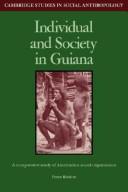| Listing 1 - 4 of 4 |
Sort by
|
Book
ISBN: 0571092721 9780571092727 Year: 1970 Publisher: London: Faber and Faber,
Abstract | Keywords | Export | Availability | Bookmark
 Loading...
Loading...Choose an application
- Reference Manager
- EndNote
- RefWorks (Direct export to RefWorks)
Carib Indians --- Fiction --- -Fiction --- Caribbean Area --- -Calinya Indians --- Caraib Indians --- Caribe Indians --- Caribice Indians --- Caribisi Indians --- Cariña Indians --- Charibbs --- Galibi Indians --- Kalinya Indians --- Kariña Indians --- Karinya Indians --- Cariban Indians --- Indians of South America --- -Caribbean Free Trade Association countries --- Caribbean Region --- Caribbean Sea Region --- West Indies Region --- Calinya Indians --- Fiction. --- Carib Indians - - Fiction --- Caribbean Area - - Fiction --- -Caribbean Area --- -Carib Indians --- -Caribbean Area -
Book
ISBN: 0571094635 9780571094639 Year: 1971 Publisher: London: Faber and Faber,
Abstract | Keywords | Export | Availability | Bookmark
 Loading...
Loading...Choose an application
- Reference Manager
- EndNote
- RefWorks (Direct export to RefWorks)
Caribbean Area --- -Fiction --- -Caribbean Free Trade Association countries --- Caribbean Region --- Caribbean Sea Region --- West Indies Region --- Fiction --- Carib Indians --- Calinya Indians --- Caraib Indians --- Caribe Indians --- Caribice Indians --- Caribisi Indians --- Cariña Indians --- Charibbs --- Galibi Indians --- Kalinya Indians --- Kariña Indians --- Karinya Indians --- Cariban Indians --- Indians of South America --- Caribbean Free Trade Association countries --- Social life and customs --- Fiction. --- Caribbean Area - - Fiction --- -Carib Indians --- -Caribbean Area -
Book
ISBN: 0511919697 1108027776 Year: 2010 Publisher: Cambridge : Cambridge University Press,
Abstract | Keywords | Export | Availability | Bookmark
 Loading...
Loading...Choose an application
- Reference Manager
- EndNote
- RefWorks (Direct export to RefWorks)
Antigua was named by Columbus in 1493, and permanently colonised by the British in 1632. The next two hundred years were full of upheaval that shaped the Caribbean island's identity: bloody battles, agricultural progress, British immigration and the establishment and then the abolition of the slave trade. The British-born author adopted Antigua as her home, and her love for the island is evident in both volumes. Legends, stories and particular island features of interest are introduced through the author's experiences and anecdotes, giving a full picture of Antigua at the turn of the eighteenth to the nineteenth century, when the island's population and landscape changed rapidly and irrevocably. Volume 2 focusses on the island's natural history and the customs, character and changing position in society of the Caribs and the imported black slave population. An overview of the changes during the period of the slave trade in the Caribbean.
African Americans --- Carib Indians. --- Lanaghan, --- Description and travel. --- Antigua --- History. --- Calinya Indians --- Caraib Indians --- Caribe Indians --- Caribice Indians --- Caribisi Indians --- Cariña Indians --- Charibbs --- Galibi Indians --- Kalinya Indians --- Kariña Indians --- Karinya Indians --- Cariban Indians --- Indians of South America --- Afro-Americans --- Black Americans --- Colored people (United States) --- Negroes --- Africans --- Ethnology --- Black people --- Flannighan, --- Flannigan, --- Self-Governing State of Antigua --- Colony of Antigua --- Leeward Islands (Federation) --- West Indies (Federation) --- Antigua and Barbuda --- Description and travel

ISBN: 0521264537 0521269970 0511558112 9780521264532 9780521269971 9780511558115 Year: 1984 Volume: 51 Publisher: Cambridge [Cambridgeshire]: Cambridge university press,
Abstract | Keywords | Export | Availability | Bookmark
 Loading...
Loading...Choose an application
- Reference Manager
- EndNote
- RefWorks (Direct export to RefWorks)
The Amerindian peoples of Guiana, the geographical region of north-east South America, have long been recognized as forming a distinct variety of the tropical forest culture. In this book, Peter Rivière employs a comparative perspective to reveal that Guianan societies, generally characterized as socially fluid and amorphous, are in fact much more highly structured than they first appear, and he identifies certain common patterns of social organization that result from sets of individual choices and relationships. By contrasting the characteristics of Guianan society with those from elsewhere in Lowland South America, he constructs a spectrum of complexity of Amerindian social structure, and argues that the Guianan variant represents the logically simplest form of organization in the area.
Indians of South America --- Carib Indians --- Social structure --- Indiens d'Amérique --- Caraïbes (Indiens) --- Structure sociale --- Social conditions --- Conditions sociales --- Social conditions. --- Indiens d'Amérique --- Caraïbes (Indiens) --- Social Sciences --- Anthropology --- Organization, Social --- Social organization --- Sociology --- Social institutions --- American aborigines --- American Indians --- Indigenous peoples --- Calinya Indians --- Caraib Indians --- Caribe Indians --- Caribice Indians --- Caribisi Indians --- Cariña Indians --- Charibbs --- Galibi Indians --- Kalinya Indians --- Kariña Indians --- Karinya Indians --- Cariban Indians --- Ethnology --- Indians of South America - Guiana - Social conditions. --- Carib Indians - Social conditions. --- Social structure - Guiana.
| Listing 1 - 4 of 4 |
Sort by
|

 Search
Search Feedback
Feedback About UniCat
About UniCat  Help
Help News
News